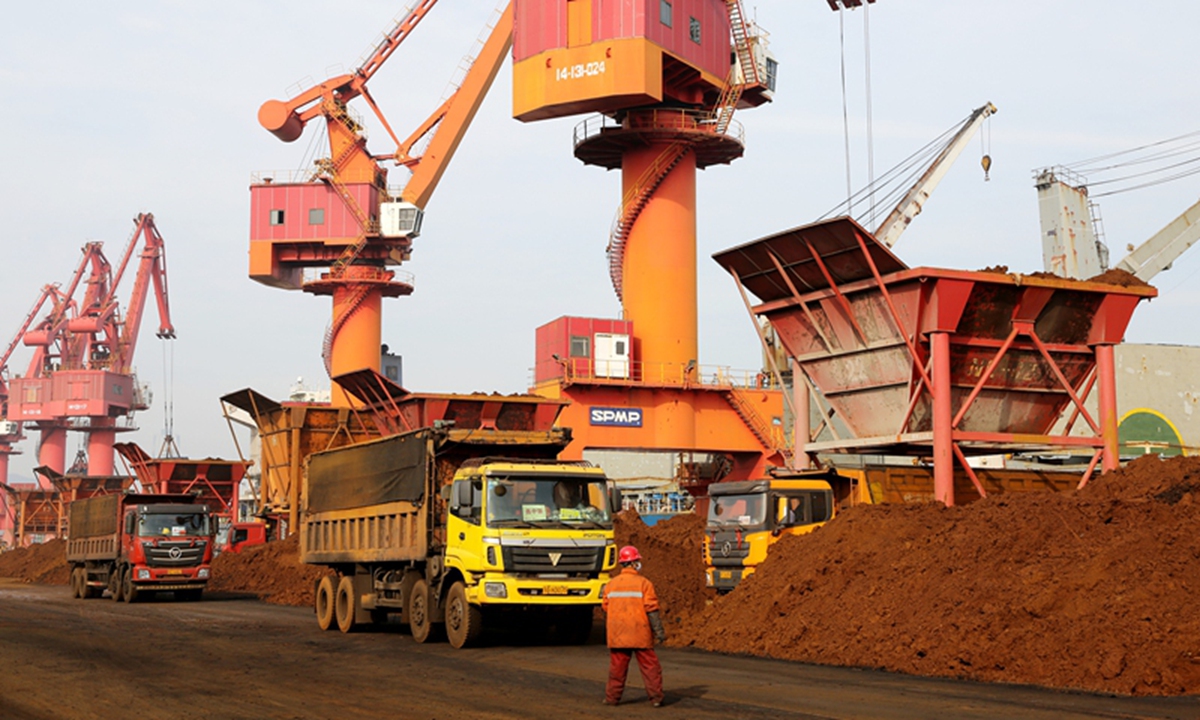Chinese, Aussie firms team up for $2b iron ore project, rare case of cooperation amid tension

Iron ore Photo:VCG
Chinese state-owned iron and steel company China Baowu Steel Group Co (Baowu) on Wednesday announced plans for a joint venture (JV) with Australia's Rio Tinto to develop the Western Range iron ore project in Pilbara in Western Australia, a rare example of China-Australian cooperation amid tense bilateral relations.
Joint investment for the mine's development will be $2 billion, the largest investment by a Chinese company in Australia since new Australian Prime Minister Anthony Albanese took office in May.
The JV, with Rio Tinto having 54 percent and Baowu taking 46 percent, is a continuation of the existing Eastern Range JV project signed in 2002, Baowu said. The JV includes construction of a primary crusher and an 18-kilometer conveyor system linking it to the existing Paraburdoo processing plant.
Construction is expected to begin in early 2023 with initial production anticipated in 2025. The construction phase will support approximately 1,600 jobs with the mine itself requiring about 800, expected to be filled by workers transitioning from other sites in the Paraburdoo mining hub, according to a press release Rio Tinto sent to the Global Times on Wednesday.
The mine is expected to unleash the huge production capacity of the Western Range - about 25 million tons of iron ore - and help to sustain production of the Pilbara Blend from Rio Tinto's existing Paraburdoo mining hub, the Australian company said.
China-Australian relations fell to the lowest ebb in decades under former Australian prime minister Scott Morrison. There has been broad expectation for improved relations under the new Australian government, but tensions have remained.
"This latest move is mutually beneficial cooperation," Chen Hong, president of the Chinese Association of Australian Studies and director of the Australian Studies Centre at East China Normal University, told the Global Times on Wednesday.
The Australian mining company needs capital and technology that its Chinese partner can offer. Meanwhile, China remains a huge market for Australian iron ore and it needs stable supplies of the raw material, driven by an economic pick-up, experts said.
"Baowu may gain stable supplies of iron ore while securing its supply chain," Wang Guoqing, research director at Beijing Lange Steel Information Research Center, told the Global Times on Wednesday.
The partnership means that the Chinese company may get a share of the profits when the iron ore price goes up, as well as more bargaining power on prices overall, Wang said.
For Australian iron ore exporters, the Chinese market is their largest, and that's reflected in the use of the yuan for settlement at ports. Experts said that further cooperation would be a win-win outcome for both sides.
More importantly, the partnership is an optimistic sign for the improvement of bilateral relations, which indicates that China-Australian relations are moving forward in a pragmatic way, according to Chen.
As bilateral relations deteriorated in 2021, Chinese investment in Australia sank 69.8 percent to $585 million. It was the lowest level in the 18 editions of KPMG's "Demystifying Chinese Investment" report, and also the lowest since the company started collecting data on Chinese investment in Australia in 2007, media reports said.
However, Australia remains a major trading partner with China, driven by the iron ore trade. In 2021, China imported 1.12 billion tons of iron ore, with 61.7 percent of it coming from Australia, data from the General Administration of Customs of China showed.
The China-Australian relationship has been declining since 2017, caused by Canberra's closely following the US' anti-China policy, but bilateral trade remained high, which exposed the fallacy of so-called "Chinese economic coercion" that some China hawks in Australia have fabricated, Chen said.
The latest cooperation is another strong rebuttal of such claims, the expert said.
While the deal still needs approval by both governments, Chen expressed optimism, extending his hope that this cooperation "can lead to further constructive steps toward the improvement of bilateral relations between China and Australia."

